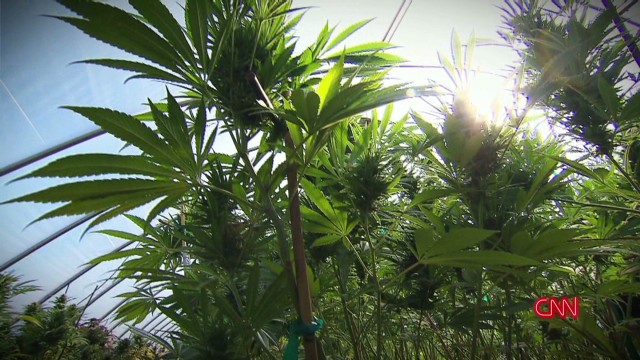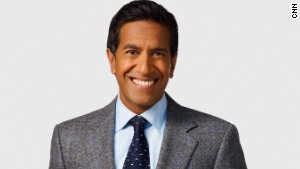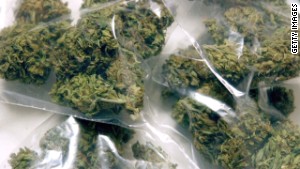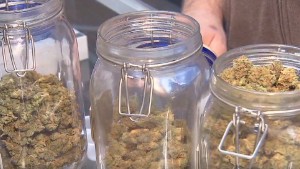The tide is FINALLY changing. Although me and many, many have been harping this same shit for a long time, in my case fucking 40 years now, we can finally sit back and watch the wave hit. HUGE injustices were perpetrated. But I for one am willing to just shut up and see medicine for sick people FINALLY be allowed for them.
http://www.cnn.com/2014/03/05/health/gupta-medical-marijuana/index.html?hpt=hp_c4
Gupta: 'I am doubling down' on medical marijuana
By Dr. Sanjay Gupta, CNN Chief Medical Correspondent
updated 3:12 PM EST, Wed March 5, 2014

Dr. Sanjay Gupta explores politics of pot
STORY HIGHLIGHTS
Editor's note: Don't miss "Weed 2: Cannabis Madness: Dr. Sanjay Gupta Reports," at 10 p.m. ET on Tuesday. Also, Dr. Gupta will be answering your questions on Reddit at noon ET Friday.
(CNN) -- It's been eight months since I last wrote about medical marijuana, apologizing for having not dug deeply into the beneficial effects of this plant and for writing articles dismissing its potential. I apologized for my own role in previously misleading people, and I feel very badly that people have suffered for too long, unable to obtain the legitimate medicine that may have helped them.
I have been reminded that a true and productive scientific journey involves a willingness to let go of established notions and get at the truth, even if it is uncomfortable and even it means having to say "sorry."
It is not easy to apologize and take your lumps, but this was never about me.
This scientific journey is about a growing number of patients who want the cannabis plant as a genuine medicine, not to get high.

Dr. Sanjay Gupta is a practicing neurosurgeon and CNN's chief medical correspondent.
It is about emerging science that not only shows and proves what marijuana can do for the body but provides better insights into the mechanisms of marijuana in the brain, helping us better understand a plant whose benefits have been documented for thousands of years. This journey is also about a Draconian system where politics override science and patients are caught in the middle.
Since our documentary "Weed" aired in August, I have continued to travel the world, investigating and asking tough questions about marijuana.
I have met with hundreds of patients, dozens of scientists and the curious majority who simply want a deeper understanding of this ancient plant. I have sat in labs and personally analyzed the molecules in marijuana that have such potential but are also a source of intense controversy. I have seen those molecules turned into medicine that has quelled epilepsy in a child and pain in a grown adult. I've seen it help a woman at the peak of her life to overcome the ravages of multiple sclerosis.
 Georgia House approves medical marijuana
Georgia House approves medical marijuana
 Fla. to vote on medical marijuana
Fla. to vote on medical marijuana
 Can medical marijuana help seizures?
Can medical marijuana help seizures?
I am more convinced than ever that it is irresponsible to not provide the best care we can, care that often may involve marijuana.
I am not backing down on medical marijuana; I am doubling down.
I should add that, although I've taken some heat for my reporting on marijuana, it hasn't been as lonely a position as I expected. Legislators from several states have reached out to me, eager to inform their own positions and asking to show the documentary to their fellow lawmakers.
I've avoided any lobbying, but of course it is gratifying to know that people with influence are paying attention to the film. One place where lawmakers saw a long clip was Georgia, where the state House just passed a medical marijuana bill by a vote of 171-4. Before the legislative session started, most people didn't think this bill had a chance.
More remarkable, many doctors and scientists, worried about being ostracized for even discussing the potential of marijuana, called me confidentially to share their own stories of the drug and the benefit it has provided to their patients. I will honor my promise not to name them, but I hope this next documentary will enable a more open discussion and advance science in the process.
Marijuana is classified as a Schedule I substance, defined as "the most dangerous" drugs "with no currently accepted medical use."
Neither of those statements has ever been factual. Even many of the most ardent critics of medical marijuana don't agree with the Schedule I classification, knowing how it's impeded the ability to conduct needed research on the plant.
Even the head of the National Institute on Drug Abuse, Dr. Nora Volkow, seems to have softened her stance; she told me she believes we need to loosen restrictions for researchers.
Along the way, the public has become intensely engaged. Our collective society has paid closer attention to this issue than ever before, and with that increased education, support for medical marijuana has only grown, including in some unexpected places.
Pete Carroll, the coach of the Super Bowl-winning Seattle Seahawks, said the National Football League should explore medical marijuana if it helps players. NFL Commissioner Roger Goodell hasn't dismissed the idea, saying that if marijuana is reconsidered by the medical establishment, the league would treat it the same as any other medicine. Goodell also says the NFL is following the science that suggests marijuana may help recovery from concussions.
Recently, I had the chance to tell him that the United States already holds a patent on medical marijuana for that very purpose. Patent No. 6630507: Cannabinoids are found to have particular application as neuroprotectants, for example in limiting neurological damage following ischemic insults, such as stroke or trauma.
However, this particular issue still bothers me: How can the government deny the benefits of medical marijuana even as it holds a patent for those very same benefits? Members of the Food and Drug Administration declined my repeated requests for an interview.
This past year, President Barack Obama told the New Yorker magazine, "I don't think (marijuana) is more dangerous than alcohol." And yet, as alcohol remains available to any adult, the president has not moved to remove marijuana from the list of the most tightly controlled substances in the country.
Since I started my reporting on this topic, I have mostly resisted temptation to inject a subjective moral equivalency into this discussion, such as pitting alcohol against marijuana or reminding you that cocaine and methamphetamine are actually more available than marijuana to patients, physicians and medical researchers: They are Schedule II drugs, with recognized medical uses. Or telling you that on average, a person dies every 19 minutes in this country from a legal prescription drug overdose, while it is virtually unheard-of to die from a marijuana overdose.
But, with a discussion like this, consistency does matter. Terms matter, too.
We are talking about a medicine, known scientifically as cannabis. In order for people to start thinking of this substance as a medicine, perhaps we should start calling it by its medical name, something that was suggested to me by medical marijuana advocates pretty much everywhere I went this year.
I've tried to pull together these latest developments in our new documentary, "Cannabis Madness." Although the 1936 film "Reefer Madness" was propaganda made to advance an agenda with dramatic falsehoods and hyperbole, I hope you will find "Cannabis Madness" an accurate reflection of what is happening today, injected with the best current science.
You will meet families all across the country -- a stay-at-home mom from Ohio, a nurse practitioner from Florida, an insurance salesman from Alabama -- more than 100 families who have all left jobs, homes, friends and family behind and moved to Colorado to get the medicine that relieves their suffering.
As things stand now, many of these good people don't ever get to return home. Why? Because transporting their medicine, even if it is a non-psychoactive cannabis oil, could get them arrested for drug trafficking. And so they are stuck, cannabis refugees.
You will meet them, and if you're like me, you'll be heartbroken to hear their stories, but you'll also have a lump in your throat when you see the raw, true love these parents have for their sick children.
History books may one day draw a parallel between this chapter of medical marijuana and the story of David and Goliath. Playing the role of David's slingshot, which ultimately brought Goliath to his knees, would be a 2-year-old girl named Vivian Wilson. She inspired her father to challenge the system in a spectacular way that caused a nation to stop for a moment and take note.
For months, we have filmed and followed the Wilson family with all of their trials and tribulations, and you will meet the whole family in the upcoming documentary.
I am a father myself, first and foremost. I don't want my children taking or being offered a psychoactive substance. As a neurosurgeon, I know that the developing brain is more susceptible to the most harmful effects of cannabis and that brain development continues well into our mid-20s.
I also worry that generations from now, my great-grandkids will find Internet headlines referring to me as the "pot doc." I do hope they will also read the rest of the story and understand the lives of the countless people who have suffered needlessly when a plant could have helped. I hope they know that I have dedicated my time to researching the medical literature, speaking to the scientists in person and piecing together a fact-based presentation meant to educate, not frighten.
I hope future generations won't consider me naive. Yes, I know there is a concern that many people out there will feign ailments just to get marijuana. But withholding legitimate treatment for the needy is a very unjust way of addressing that concern.
As a physician and reporter, I feel a deeper obligation to present the real stories, soundly supported with the science from all over the world.
When I first apologized for my previous marijuana reporting, I was thinking about the impact that reporting may have had on Charlotte Figi. She is a sweet little girl whose brain was locked in nearly nonstop seizure activity. Without success, she tried seven different medications, stringent diets and high-dose supplements. Modern medicine had nothing more to offer, which is why her parents turned to an ancient plant. As you know, it worked.
And, as you will see, she is one of so many patients out there, suffering from different ailments, who believe cannabis rescued them when nothing else did.
For conditions like Charlotte's, the American Epilepsy Society says that there are a million people for whom existing therapies do not control their seizures. The society recently said anecdotes about medical marijuana "give reason for hope" and said it supports "well-controlled studies that will lead to a better understanding of the disease and the development of safe and effective treatments."
You should know that Charlotte continues to do well. When I saw her around the holidays, she ran over and gave me a hug. She looked me in the eyes, took me by the hand and led me all around to meet her friends. She is a delightful, happy and now healthy little girl.
I know the discussion around this topic will no doubt get heated. I have felt that heat. But I feel a greater responsibility than ever to make sure those heated discussions are also well-informed by science.
And, with that: I hope you get a chance to watch on March 11 at 10 p.m. Eastern.
http://www.cnn.com/2014/03/05/health/gupta-medical-marijuana/index.html?hpt=hp_c4
Gupta: 'I am doubling down' on medical marijuana
By Dr. Sanjay Gupta, CNN Chief Medical Correspondent
updated 3:12 PM EST, Wed March 5, 2014

Dr. Sanjay Gupta explores politics of pot
STORY HIGHLIGHTS
- A growing number of patients want cannabis as a medicine
- "It is irresponsible to not provide the best care we can," Sanjay Gupta says
- Those with influence are paying attention to the debate
- The public has become intensely engaged
Editor's note: Don't miss "Weed 2: Cannabis Madness: Dr. Sanjay Gupta Reports," at 10 p.m. ET on Tuesday. Also, Dr. Gupta will be answering your questions on Reddit at noon ET Friday.
(CNN) -- It's been eight months since I last wrote about medical marijuana, apologizing for having not dug deeply into the beneficial effects of this plant and for writing articles dismissing its potential. I apologized for my own role in previously misleading people, and I feel very badly that people have suffered for too long, unable to obtain the legitimate medicine that may have helped them.
I have been reminded that a true and productive scientific journey involves a willingness to let go of established notions and get at the truth, even if it is uncomfortable and even it means having to say "sorry."
It is not easy to apologize and take your lumps, but this was never about me.
This scientific journey is about a growing number of patients who want the cannabis plant as a genuine medicine, not to get high.

Dr. Sanjay Gupta is a practicing neurosurgeon and CNN's chief medical correspondent.
It is about emerging science that not only shows and proves what marijuana can do for the body but provides better insights into the mechanisms of marijuana in the brain, helping us better understand a plant whose benefits have been documented for thousands of years. This journey is also about a Draconian system where politics override science and patients are caught in the middle.
Since our documentary "Weed" aired in August, I have continued to travel the world, investigating and asking tough questions about marijuana.
I have met with hundreds of patients, dozens of scientists and the curious majority who simply want a deeper understanding of this ancient plant. I have sat in labs and personally analyzed the molecules in marijuana that have such potential but are also a source of intense controversy. I have seen those molecules turned into medicine that has quelled epilepsy in a child and pain in a grown adult. I've seen it help a woman at the peak of her life to overcome the ravages of multiple sclerosis.



I am more convinced than ever that it is irresponsible to not provide the best care we can, care that often may involve marijuana.
I am not backing down on medical marijuana; I am doubling down.
I should add that, although I've taken some heat for my reporting on marijuana, it hasn't been as lonely a position as I expected. Legislators from several states have reached out to me, eager to inform their own positions and asking to show the documentary to their fellow lawmakers.
I've avoided any lobbying, but of course it is gratifying to know that people with influence are paying attention to the film. One place where lawmakers saw a long clip was Georgia, where the state House just passed a medical marijuana bill by a vote of 171-4. Before the legislative session started, most people didn't think this bill had a chance.
More remarkable, many doctors and scientists, worried about being ostracized for even discussing the potential of marijuana, called me confidentially to share their own stories of the drug and the benefit it has provided to their patients. I will honor my promise not to name them, but I hope this next documentary will enable a more open discussion and advance science in the process.
Marijuana is classified as a Schedule I substance, defined as "the most dangerous" drugs "with no currently accepted medical use."
Neither of those statements has ever been factual. Even many of the most ardent critics of medical marijuana don't agree with the Schedule I classification, knowing how it's impeded the ability to conduct needed research on the plant.
Even the head of the National Institute on Drug Abuse, Dr. Nora Volkow, seems to have softened her stance; she told me she believes we need to loosen restrictions for researchers.
Along the way, the public has become intensely engaged. Our collective society has paid closer attention to this issue than ever before, and with that increased education, support for medical marijuana has only grown, including in some unexpected places.
Pete Carroll, the coach of the Super Bowl-winning Seattle Seahawks, said the National Football League should explore medical marijuana if it helps players. NFL Commissioner Roger Goodell hasn't dismissed the idea, saying that if marijuana is reconsidered by the medical establishment, the league would treat it the same as any other medicine. Goodell also says the NFL is following the science that suggests marijuana may help recovery from concussions.
Recently, I had the chance to tell him that the United States already holds a patent on medical marijuana for that very purpose. Patent No. 6630507: Cannabinoids are found to have particular application as neuroprotectants, for example in limiting neurological damage following ischemic insults, such as stroke or trauma.
However, this particular issue still bothers me: How can the government deny the benefits of medical marijuana even as it holds a patent for those very same benefits? Members of the Food and Drug Administration declined my repeated requests for an interview.
This past year, President Barack Obama told the New Yorker magazine, "I don't think (marijuana) is more dangerous than alcohol." And yet, as alcohol remains available to any adult, the president has not moved to remove marijuana from the list of the most tightly controlled substances in the country.
Since I started my reporting on this topic, I have mostly resisted temptation to inject a subjective moral equivalency into this discussion, such as pitting alcohol against marijuana or reminding you that cocaine and methamphetamine are actually more available than marijuana to patients, physicians and medical researchers: They are Schedule II drugs, with recognized medical uses. Or telling you that on average, a person dies every 19 minutes in this country from a legal prescription drug overdose, while it is virtually unheard-of to die from a marijuana overdose.
But, with a discussion like this, consistency does matter. Terms matter, too.
We are talking about a medicine, known scientifically as cannabis. In order for people to start thinking of this substance as a medicine, perhaps we should start calling it by its medical name, something that was suggested to me by medical marijuana advocates pretty much everywhere I went this year.
I've tried to pull together these latest developments in our new documentary, "Cannabis Madness." Although the 1936 film "Reefer Madness" was propaganda made to advance an agenda with dramatic falsehoods and hyperbole, I hope you will find "Cannabis Madness" an accurate reflection of what is happening today, injected with the best current science.
You will meet families all across the country -- a stay-at-home mom from Ohio, a nurse practitioner from Florida, an insurance salesman from Alabama -- more than 100 families who have all left jobs, homes, friends and family behind and moved to Colorado to get the medicine that relieves their suffering.
As things stand now, many of these good people don't ever get to return home. Why? Because transporting their medicine, even if it is a non-psychoactive cannabis oil, could get them arrested for drug trafficking. And so they are stuck, cannabis refugees.
You will meet them, and if you're like me, you'll be heartbroken to hear their stories, but you'll also have a lump in your throat when you see the raw, true love these parents have for their sick children.
History books may one day draw a parallel between this chapter of medical marijuana and the story of David and Goliath. Playing the role of David's slingshot, which ultimately brought Goliath to his knees, would be a 2-year-old girl named Vivian Wilson. She inspired her father to challenge the system in a spectacular way that caused a nation to stop for a moment and take note.
For months, we have filmed and followed the Wilson family with all of their trials and tribulations, and you will meet the whole family in the upcoming documentary.
I am a father myself, first and foremost. I don't want my children taking or being offered a psychoactive substance. As a neurosurgeon, I know that the developing brain is more susceptible to the most harmful effects of cannabis and that brain development continues well into our mid-20s.
I also worry that generations from now, my great-grandkids will find Internet headlines referring to me as the "pot doc." I do hope they will also read the rest of the story and understand the lives of the countless people who have suffered needlessly when a plant could have helped. I hope they know that I have dedicated my time to researching the medical literature, speaking to the scientists in person and piecing together a fact-based presentation meant to educate, not frighten.
I hope future generations won't consider me naive. Yes, I know there is a concern that many people out there will feign ailments just to get marijuana. But withholding legitimate treatment for the needy is a very unjust way of addressing that concern.
As a physician and reporter, I feel a deeper obligation to present the real stories, soundly supported with the science from all over the world.
When I first apologized for my previous marijuana reporting, I was thinking about the impact that reporting may have had on Charlotte Figi. She is a sweet little girl whose brain was locked in nearly nonstop seizure activity. Without success, she tried seven different medications, stringent diets and high-dose supplements. Modern medicine had nothing more to offer, which is why her parents turned to an ancient plant. As you know, it worked.
And, as you will see, she is one of so many patients out there, suffering from different ailments, who believe cannabis rescued them when nothing else did.
For conditions like Charlotte's, the American Epilepsy Society says that there are a million people for whom existing therapies do not control their seizures. The society recently said anecdotes about medical marijuana "give reason for hope" and said it supports "well-controlled studies that will lead to a better understanding of the disease and the development of safe and effective treatments."
You should know that Charlotte continues to do well. When I saw her around the holidays, she ran over and gave me a hug. She looked me in the eyes, took me by the hand and led me all around to meet her friends. She is a delightful, happy and now healthy little girl.
I know the discussion around this topic will no doubt get heated. I have felt that heat. But I feel a greater responsibility than ever to make sure those heated discussions are also well-informed by science.
And, with that: I hope you get a chance to watch on March 11 at 10 p.m. Eastern.







